中考专项复习——情态动词
图片预览

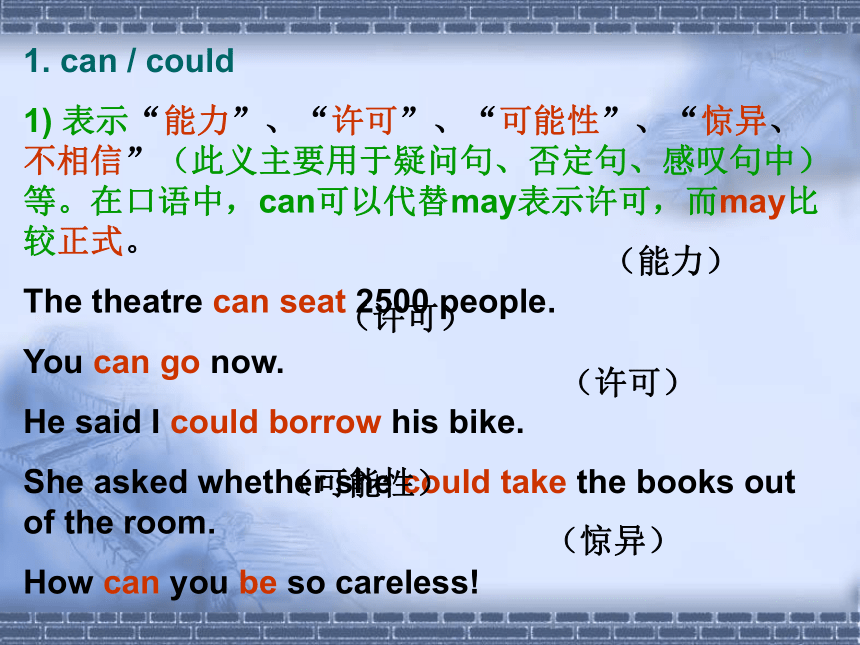
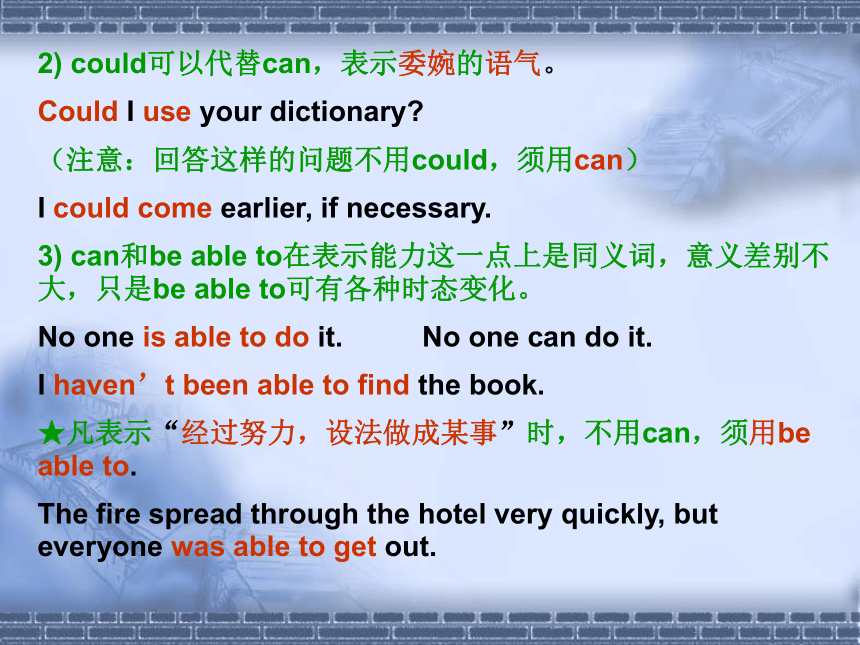
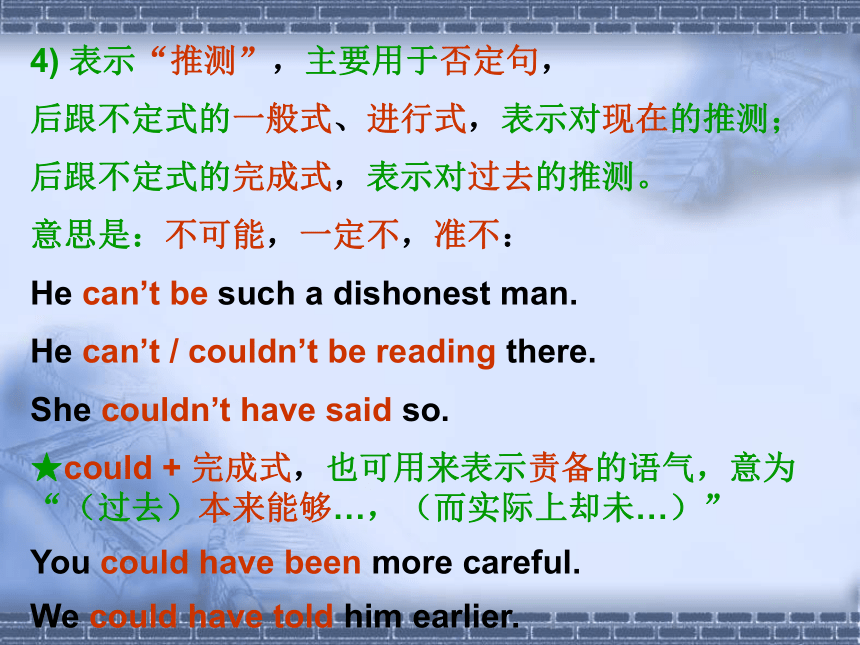
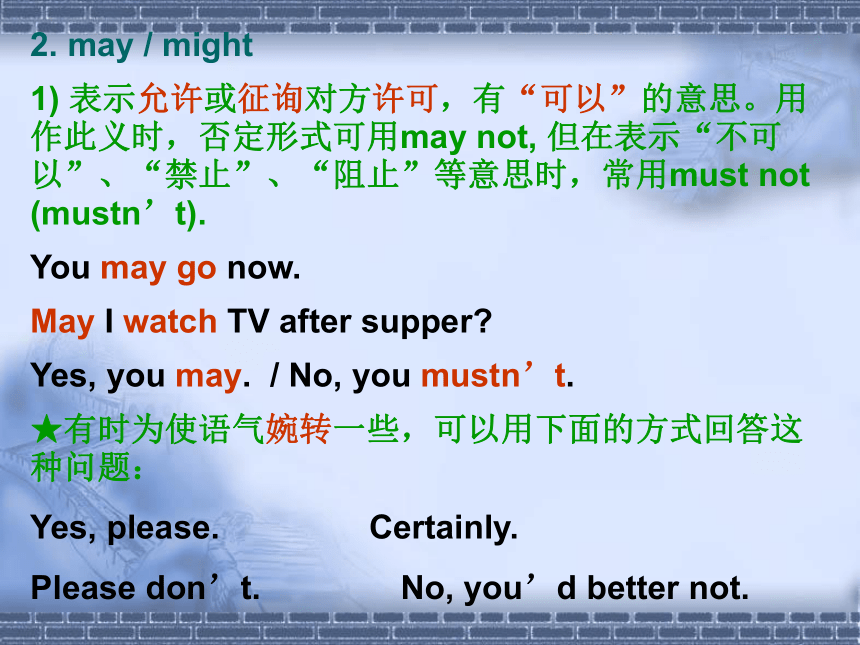
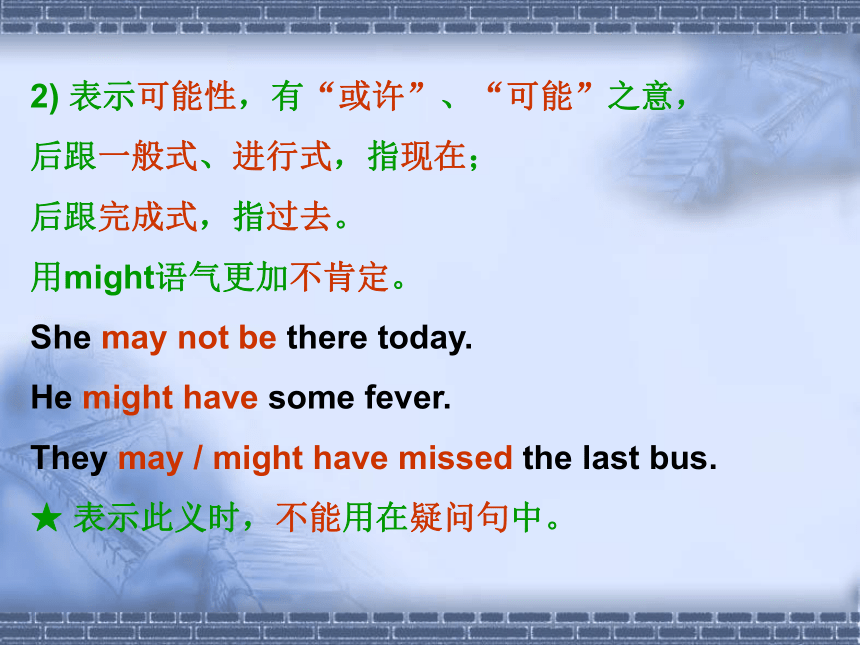
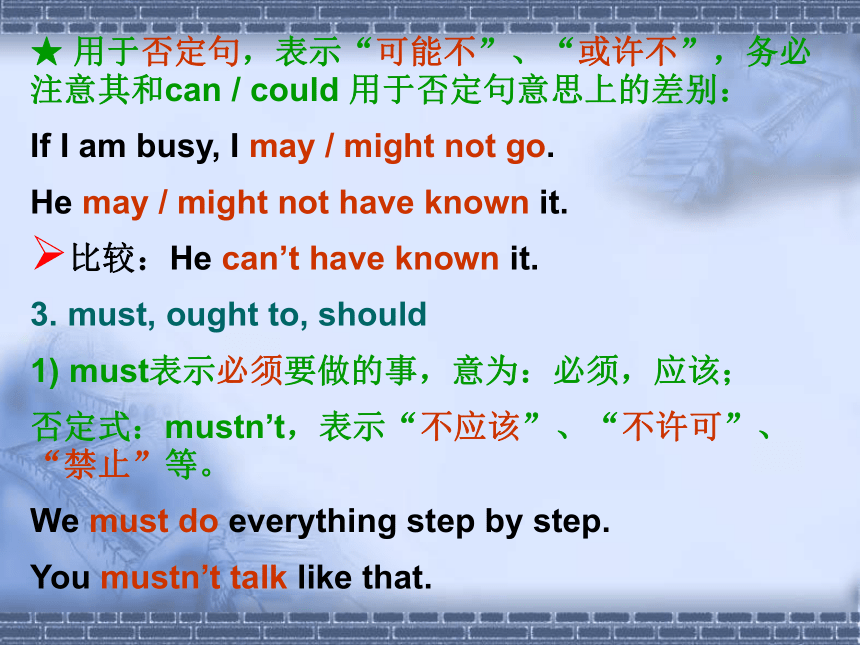


文档简介
课件24张PPT。情 态 动 词
情态动词表示说话人对某一动作或状态的态度,认为“可能”、“应当”、“必要”等等,但本身词义不完全,不能单独作谓语,必须和不带to的动词不定式(ought除外)连用。情态动词没有人称和数的变化。1. can / could
1) 表示“能力”、“许可”、“可能性”、“惊异、不相信”(此义主要用于疑问句、否定句、感叹句中)等。在口语中,can可以代替may表示许可,而may比较正式。
The theatre can seat 2500 people.
You can go now.
He said I could borrow his bike.
She asked whether she could take the books out of the room.
How can you be so careless! (能力)(许可)(许可)(可能性)(惊异)2) could可以代替can,表示委婉的语气。
Could I use your dictionary?
(注意:回答这样的问题不用could,须用can)
I could come earlier, if necessary.
3) can和be able to在表示能力这一点上是同义词,意义差别不大,只是be able to可有各种时态变化。
No one is able to do it. No one can do it.
I haven’t been able to find the book.
★凡表示“经过努力,设法做成某事”时,不用can,须用be able to.
The fire spread through the hotel very quickly, but everyone was able to get out.4) 表示“推测”,主要用于否定句,
后跟不定式的一般式、进行式,表示对现在的推测;
后跟不定式的完成式,表示对过去的推测。
意思是:不可能,一定不,准不:
He can’t be such a dishonest man.
He can’t / couldn’t be reading there.
She couldn’t have said so.
★could + 完成式,也可用来表示责备的语气,意为“(过去)本来能够…,(而实际上却未…)”
You could have been more careful.
We could have told him earlier.2. may / might
1) 表示允许或征询对方许可,有“可以”的意思。用作此义时,否定形式可用may not, 但在表示“不可以”、“禁止”、“阻止”等意思时,常用must not (mustn’t).
You may go now.
May I watch TV after supper?
Yes, you may. / No, you mustn’t.
★有时为使语气婉转一些,可以用下面的方式回答这种问题:
Yes, please. Certainly.
Please don’t. No, you’d better not.2) 表示可能性,有“或许”、“可能”之意,
后跟一般式、进行式,指现在;
后跟完成式,指过去。
用might语气更加不肯定。
She may not be there today.
He might have some fever.
They may / might have missed the last bus.
★ 表示此义时,不能用在疑问句中。★ 用于否定句,表示“可能不”、“或许不”,务必注意其和can / could 用于否定句意思上的差别:
If I am busy, I may / might not go.
He may / might not have known it.
比较:He can’t have known it.
3. must, ought to, should
1) must表示必须要做的事,意为:必须,应该;
否定式:mustn’t,表示“不应该”、“不许可”、“禁止”等。
We must do everything step by step.
You mustn’t talk like that.★在回答由must引起的问题时,如果是否定的答复,不能用mustn’t(一定不要,不能),
而要用needn’t / don’t have to(不必):
Must I be home before eight o’clock?
Yes, you must.
No, you needn’t. / No, you don’t have to.
2) must表示推测,只用在肯定句中,
后跟一般式、进行式表示对现在的推测;
后跟完成式表示对过去的推测,
意即:“一定,想必”等:
There must be a mistake.
He must be sleeping at this time of day.No one answered the phone. They must have already gone out.
His watch must have stopped. I will go and call him.
We must have been playing tennis in the park when you called.
★ 在表示“必须”这个意思时,must和have to是很接近的,在过去时、将来时、完成时中,用have to来代替must。在现在时中,must和have to常表示相同的意义,但have to比较强调客观的需要,must着重说明主观的义务或必要;口语中较常用have to:
We must / have to leave now.We must stay home, mustn’t we?
He had to stop smoking because his girl friend didn’t like it.
You’ll have to go there alone.
3) ought to表示应该做的事情(和should差不多,只是口气稍重一些)或非常可能的事。
You ought to follow your father’s advice.
Oughtn’t we to give him a chance to try?
There is a fine sunset, it ought to be a fine day tomorrow.★ 表示应该做的事情时,should是ought to的同义词,大多数情况下,含义大致相同,但也有一些差别:ought to更多反映客观情况,在表示因责任、义务、规定等该做的事情时使用;
在表示某件事宜于做时,多用should(谈的是自己的主观看法)。下面句中这两个词不宜换用:
You are his father. You ought to take care of him.
We ought to go and see Mary tomorrow, but I don’t think we will.
We should not use too many big words in our everyday speech.★ should / ought to have done
You should have come to attend the meeting, but you didn't.
Look what you have done. You should not have been so careless.
You ought not to have taken the book out of the reading-room.
4. need可以作情态动词,意为:需要,主要用于否定句和疑问句。
Need you go so soon?
Yes, I must.
No, I needn’t.
That’s all settled. It needn’t be talked about.
I don’t think you need worry.
Now there need be no discussion about this question.
★如果用作vt 和不定式连用,可用于各种结构:
Does he need to know it?
This question needs to be discussed.You don’t need to do it yourself.
(这种否定形式较文气,口语中用needn’t更多一些)
★need not + 完成式
You needn’t have done so.
We needn’t have got up so early.
5. dare也可用作情态动词,作“敢”解,主要用于疑问句、否定句和条件句。
How dare you say I’m unfair?
She dare not say what she thinks.
I won’t allow you to jump over the rock, even if you dare do it.
但现在用作vt的时候更多一些,可以跟不定式,用于各种结构。I wonder how he dared to do such a thing.
He has never dared to tell his father about it.
She stopped at the door, not daring to enter.
间或有这样的句子(不定式不带to)
He did not dare speak before the class.
He does not dare ask the teacher questions.
★除了在I dare say这种习语中,dare很少在肯定结构中作情态动词。6. shall
shall作为情态动词,用于第二、三人称,表示说话人的意愿,有“命令”、“警告”、“威胁”、“强制”、“允诺”等意思。
You shall do as I say.
Tell him that he shall have the book tomorrow.
You naughty boy! You shall get what you deserve.
No, he shan’t go.
★用在问句中征求对方意见和指示,用于第一、第三人称:
Shall I open the window?
What shall we do next?命令允诺强制警告Shall he come to see you?
CP: Will he come to see you?
7. will / would
1) will表示“意志”、“意愿”,用于各种人称:
I will tell you all about it.
He won’t go.
2) will用于疑问句,表示请求、邀请,用于第二人称:
Will you please give him a message when you see him?
Won’t you sit down?3) will也可表示某种倾向或习惯性动作,有“总是”、“惯于”之意:
Fish will die out of water.
He’ll talk for hours if you give him the chance.
No matter what you may say, he will always stick to his own views.
What’s the matter with the door? It won’t lock.
4) would 是 will 的过去式,表示过去时间的“意志”、“愿望”,用于各种人称:
I promised that I would do my best.
They would not let Tom in because he was a black boy.5) would表示说话人的意愿或请求,语气比will婉转(指现在时间):
Would you like some bananas?
I’d like to see your new dictionary.
6) would表示过去的习惯动作或一种倾向:
She would sit like that for hours.
Every day he would get up at six and light the fire.
He told me the box wouldn’t open.【例1】—Where's Mr Li?I have something unusual to tell him.?
—You ____ find him.He______Japan.[2003,黑龙江]
A.may not,has gone to?
B.may not, has been to ?
C.can't,has gone to?
D.can't, has been to? 典型例题解析【例3】—Where is Jack,please??
—He______be in the classroom.[2003,杭州]?
A.can B.need?
C.would D.must?C【例2】 —Could I look at your pictures??
—Yes,of course you _________.[2003,武汉]?
A.could B.can?
C.will D.might?BD 【例4】 The boy said he had to speak English in class,
but he speak it after class.[2003,广州]?
A.could B.didn't have to?
C.might D.shouldn't? 典型例题解析B 【例5】These books_________out of the reading
room.You have to read,them here.[2003,辽宁]? A.can't take?
B.must be taken?
C.can take?
D.mustn't be taken? D1._________I open the window? It's hot here.?
A. Must B. Shall? C. Will D. Would?
2.Go and ask Mr. Liu. He _________tell you.?
A. may B. can? C. would D. could?
3._________you please tell me the time please??
A. Shall B. Will? C. May D. Might?
4.—_________I try out all the ideas??
—No, you _________.?
A. Must, mustn't ? B. Need, need?
C. Must, don't have to? D. Must, don't?
5._________I speak to Mr. Green,please??
A. Will B. Could? C. Must D. Would? ? 课时训练BABCB6.He said Kate _____come to the party.But I don't think so.
A. could B. might? C. need D. must?
7.—Need I do my lessons right now??
—Yes, you_________.?
A. need B. can ?C. should D. must?
8.—Would you like to go swimming with me this afternoon?
—I'd love to. But I'm afraid I___.I have too much work to do.
A. can't B. mustn't? C. needn't D. may not?
9.To make our city more beautiful,rubbish_________ into the river.
A. needn't be thrown ?B. mustn't be thrown?
C. can't throw? D. may not throw?
10.Don't worry! We can get to the bus station in time and
_________the early bus.
A. don't miss B. can miss? C. will miss D. won't miss?课时训练BD AB D11.—Please don't make any noise in the reading room.?
—_________?
A. Sorry, I won't. B. Sorry, I can't.?
C. Yes, I won't. D.OK,I didn't.?
12.—Must I return your digital camera tomorrow. Tina??
—No, you_________.?
A. mustn't B. may not? C. needn't D. won't?
13.—Would you like some more??
—_________I'm full.?
A. Yes, please. B. I'd love to.?
C. No, I wouldn't. D. No, thanks.?
14.You_________swim in this part of the lake.?
It's dangerous.?
A. mustn't B. may not ?C. needn't D. won't?
课时训练ACAD
情态动词表示说话人对某一动作或状态的态度,认为“可能”、“应当”、“必要”等等,但本身词义不完全,不能单独作谓语,必须和不带to的动词不定式(ought除外)连用。情态动词没有人称和数的变化。1. can / could
1) 表示“能力”、“许可”、“可能性”、“惊异、不相信”(此义主要用于疑问句、否定句、感叹句中)等。在口语中,can可以代替may表示许可,而may比较正式。
The theatre can seat 2500 people.
You can go now.
He said I could borrow his bike.
She asked whether she could take the books out of the room.
How can you be so careless! (能力)(许可)(许可)(可能性)(惊异)2) could可以代替can,表示委婉的语气。
Could I use your dictionary?
(注意:回答这样的问题不用could,须用can)
I could come earlier, if necessary.
3) can和be able to在表示能力这一点上是同义词,意义差别不大,只是be able to可有各种时态变化。
No one is able to do it. No one can do it.
I haven’t been able to find the book.
★凡表示“经过努力,设法做成某事”时,不用can,须用be able to.
The fire spread through the hotel very quickly, but everyone was able to get out.4) 表示“推测”,主要用于否定句,
后跟不定式的一般式、进行式,表示对现在的推测;
后跟不定式的完成式,表示对过去的推测。
意思是:不可能,一定不,准不:
He can’t be such a dishonest man.
He can’t / couldn’t be reading there.
She couldn’t have said so.
★could + 完成式,也可用来表示责备的语气,意为“(过去)本来能够…,(而实际上却未…)”
You could have been more careful.
We could have told him earlier.2. may / might
1) 表示允许或征询对方许可,有“可以”的意思。用作此义时,否定形式可用may not, 但在表示“不可以”、“禁止”、“阻止”等意思时,常用must not (mustn’t).
You may go now.
May I watch TV after supper?
Yes, you may. / No, you mustn’t.
★有时为使语气婉转一些,可以用下面的方式回答这种问题:
Yes, please. Certainly.
Please don’t. No, you’d better not.2) 表示可能性,有“或许”、“可能”之意,
后跟一般式、进行式,指现在;
后跟完成式,指过去。
用might语气更加不肯定。
She may not be there today.
He might have some fever.
They may / might have missed the last bus.
★ 表示此义时,不能用在疑问句中。★ 用于否定句,表示“可能不”、“或许不”,务必注意其和can / could 用于否定句意思上的差别:
If I am busy, I may / might not go.
He may / might not have known it.
比较:He can’t have known it.
3. must, ought to, should
1) must表示必须要做的事,意为:必须,应该;
否定式:mustn’t,表示“不应该”、“不许可”、“禁止”等。
We must do everything step by step.
You mustn’t talk like that.★在回答由must引起的问题时,如果是否定的答复,不能用mustn’t(一定不要,不能),
而要用needn’t / don’t have to(不必):
Must I be home before eight o’clock?
Yes, you must.
No, you needn’t. / No, you don’t have to.
2) must表示推测,只用在肯定句中,
后跟一般式、进行式表示对现在的推测;
后跟完成式表示对过去的推测,
意即:“一定,想必”等:
There must be a mistake.
He must be sleeping at this time of day.No one answered the phone. They must have already gone out.
His watch must have stopped. I will go and call him.
We must have been playing tennis in the park when you called.
★ 在表示“必须”这个意思时,must和have to是很接近的,在过去时、将来时、完成时中,用have to来代替must。在现在时中,must和have to常表示相同的意义,但have to比较强调客观的需要,must着重说明主观的义务或必要;口语中较常用have to:
We must / have to leave now.We must stay home, mustn’t we?
He had to stop smoking because his girl friend didn’t like it.
You’ll have to go there alone.
3) ought to表示应该做的事情(和should差不多,只是口气稍重一些)或非常可能的事。
You ought to follow your father’s advice.
Oughtn’t we to give him a chance to try?
There is a fine sunset, it ought to be a fine day tomorrow.★ 表示应该做的事情时,should是ought to的同义词,大多数情况下,含义大致相同,但也有一些差别:ought to更多反映客观情况,在表示因责任、义务、规定等该做的事情时使用;
在表示某件事宜于做时,多用should(谈的是自己的主观看法)。下面句中这两个词不宜换用:
You are his father. You ought to take care of him.
We ought to go and see Mary tomorrow, but I don’t think we will.
We should not use too many big words in our everyday speech.★ should / ought to have done
You should have come to attend the meeting, but you didn't.
Look what you have done. You should not have been so careless.
You ought not to have taken the book out of the reading-room.
4. need可以作情态动词,意为:需要,主要用于否定句和疑问句。
Need you go so soon?
Yes, I must.
No, I needn’t.
That’s all settled. It needn’t be talked about.
I don’t think you need worry.
Now there need be no discussion about this question.
★如果用作vt 和不定式连用,可用于各种结构:
Does he need to know it?
This question needs to be discussed.You don’t need to do it yourself.
(这种否定形式较文气,口语中用needn’t更多一些)
★need not + 完成式
You needn’t have done so.
We needn’t have got up so early.
5. dare也可用作情态动词,作“敢”解,主要用于疑问句、否定句和条件句。
How dare you say I’m unfair?
She dare not say what she thinks.
I won’t allow you to jump over the rock, even if you dare do it.
但现在用作vt的时候更多一些,可以跟不定式,用于各种结构。I wonder how he dared to do such a thing.
He has never dared to tell his father about it.
She stopped at the door, not daring to enter.
间或有这样的句子(不定式不带to)
He did not dare speak before the class.
He does not dare ask the teacher questions.
★除了在I dare say这种习语中,dare很少在肯定结构中作情态动词。6. shall
shall作为情态动词,用于第二、三人称,表示说话人的意愿,有“命令”、“警告”、“威胁”、“强制”、“允诺”等意思。
You shall do as I say.
Tell him that he shall have the book tomorrow.
You naughty boy! You shall get what you deserve.
No, he shan’t go.
★用在问句中征求对方意见和指示,用于第一、第三人称:
Shall I open the window?
What shall we do next?命令允诺强制警告Shall he come to see you?
CP: Will he come to see you?
7. will / would
1) will表示“意志”、“意愿”,用于各种人称:
I will tell you all about it.
He won’t go.
2) will用于疑问句,表示请求、邀请,用于第二人称:
Will you please give him a message when you see him?
Won’t you sit down?3) will也可表示某种倾向或习惯性动作,有“总是”、“惯于”之意:
Fish will die out of water.
He’ll talk for hours if you give him the chance.
No matter what you may say, he will always stick to his own views.
What’s the matter with the door? It won’t lock.
4) would 是 will 的过去式,表示过去时间的“意志”、“愿望”,用于各种人称:
I promised that I would do my best.
They would not let Tom in because he was a black boy.5) would表示说话人的意愿或请求,语气比will婉转(指现在时间):
Would you like some bananas?
I’d like to see your new dictionary.
6) would表示过去的习惯动作或一种倾向:
She would sit like that for hours.
Every day he would get up at six and light the fire.
He told me the box wouldn’t open.【例1】—Where's Mr Li?I have something unusual to tell him.?
—You ____ find him.He______Japan.[2003,黑龙江]
A.may not,has gone to?
B.may not, has been to ?
C.can't,has gone to?
D.can't, has been to? 典型例题解析【例3】—Where is Jack,please??
—He______be in the classroom.[2003,杭州]?
A.can B.need?
C.would D.must?C【例2】 —Could I look at your pictures??
—Yes,of course you _________.[2003,武汉]?
A.could B.can?
C.will D.might?BD 【例4】 The boy said he had to speak English in class,
but he speak it after class.[2003,广州]?
A.could B.didn't have to?
C.might D.shouldn't? 典型例题解析B 【例5】These books_________out of the reading
room.You have to read,them here.[2003,辽宁]? A.can't take?
B.must be taken?
C.can take?
D.mustn't be taken? D1._________I open the window? It's hot here.?
A. Must B. Shall? C. Will D. Would?
2.Go and ask Mr. Liu. He _________tell you.?
A. may B. can? C. would D. could?
3._________you please tell me the time please??
A. Shall B. Will? C. May D. Might?
4.—_________I try out all the ideas??
—No, you _________.?
A. Must, mustn't ? B. Need, need?
C. Must, don't have to? D. Must, don't?
5._________I speak to Mr. Green,please??
A. Will B. Could? C. Must D. Would? ? 课时训练BABCB6.He said Kate _____come to the party.But I don't think so.
A. could B. might? C. need D. must?
7.—Need I do my lessons right now??
—Yes, you_________.?
A. need B. can ?C. should D. must?
8.—Would you like to go swimming with me this afternoon?
—I'd love to. But I'm afraid I___.I have too much work to do.
A. can't B. mustn't? C. needn't D. may not?
9.To make our city more beautiful,rubbish_________ into the river.
A. needn't be thrown ?B. mustn't be thrown?
C. can't throw? D. may not throw?
10.Don't worry! We can get to the bus station in time and
_________the early bus.
A. don't miss B. can miss? C. will miss D. won't miss?课时训练BD AB D11.—Please don't make any noise in the reading room.?
—_________?
A. Sorry, I won't. B. Sorry, I can't.?
C. Yes, I won't. D.OK,I didn't.?
12.—Must I return your digital camera tomorrow. Tina??
—No, you_________.?
A. mustn't B. may not? C. needn't D. won't?
13.—Would you like some more??
—_________I'm full.?
A. Yes, please. B. I'd love to.?
C. No, I wouldn't. D. No, thanks.?
14.You_________swim in this part of the lake.?
It's dangerous.?
A. mustn't B. may not ?C. needn't D. won't?
课时训练ACAD
同课章节目录
- 词法
- 名词
- 动词和动词短语
- 动词语态
- 动词时态
- 助动词和情态动词
- 非谓语动词
- 冠词
- 代词
- 数词和量词
- 形容词副词及其比较等级
- 介词和介词短语
- 连词和感叹词
- 构词法
- 相似、相近词比较
- 句法
- 陈述句
- 一般疑问句和否定疑问句
- 特殊疑问句及选择疑问句
- 反意疑问句
- 存在句(There be句型)
- 宾语从句
- 定语从句
- 状语从句
- 主谓一致问题
- 简单句
- 并列句
- 复合句
- 主谓一致
- 主、表语从句
- 名词性从句
- 直接引语和间接引语
- 虚拟语气
- 感叹句
- 强调句
- 倒装句
- 祈使句
- 句子的成分
- 句子的分类
- 题型专区
- 单项选择部分
- 易错题
- 完形填空
- 阅读理解
- 词汇练习
- 听说训练
- 句型转换
- 补全对话
- 短文改错
- 翻译
- 书面表达
- 任务型阅读
- 语法填空
- 其他资料
